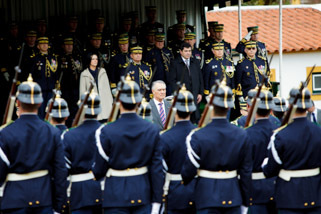
Good afternoon to all,
I am really very pleased to render this tribute to “Fado” and its protagonists, here in the Palace of Belém, after receiving the news of UNESCO’s decision to include “Fado” in its Representative List of Intangible World Cultural Heritage.
I gave this initiative my Higher Sponsorship from its very start. In June 2010 I received the Committee responsible for the candidacy and I well recall the enthusiasm with which they imbued the process and the guarantees given that, based on the work carried out and the strictness of the preparations, it would be difficult for the candidacy not to succeed.
“Fado” is perhaps the most significant form of artistic expression in Portugal, which most identifies us internationally, and that better interprets the soul of our people.
From this candidacy, and from the study and research that accompanied it, it is very clear that “Fado” is not a simple subject: it has many tonic keys, many secrets, many recesses, as many as the streets and mews of Alfama or Mouraria Lisbon quarters.
This candidacy encouraged, as none had ever before, the study of “Fado” and the search for the deepest sense of our song. I must thus congratulate the Candidacy Committee and the Scientific Committee for the important work they carried out.
Its origins go back to the 19th century, but many researchers believe that it goes much longer back in time.
Although it is true that “Fado” is nowadays recognized and prized by the Portuguese and by those that listen to it outside our borders, it has not always been so.
Time was when “Fado” was akin to bohemian living that embodied pictures of a less than recommendable Lisbon environment.
But this changed, little by little, and “Fado” regenerated its image, many noted poets successfully scripted their words, and thus became a visiting card, not just of Lisbon, but of all of Portugal.
At a time when the more important and largest performing arenas continues closed to “Fado” , this was played and sung in the so called “Fado Houses”, where “Fado” lovers and even tourists were able to enjoy some of the better and more significant “Fado” voices.
Alfredo Marceneiro, Carlos Ramos, Maria Amélia Proença, Berta Cardoso, Maria Teresa de Noronha, Hermínia Silva, Fernando Farinha, Fernando Maurício, Lucília do Carmo, are some of the greater names in the History of “Fado”.
And it would obviously be impossible to speak of “Fado” without a very special mention to the great Amália Rodrigues who chose the best Portuguese musicians, composers and poets to sing them with her unique voice and interpretation, forever bringing “Fado” to the front and inspiring generations of “Fado” protagonists. She spread “Fado” throughout the world.
“Fado”, just as everything else that has intrinsic qualities, resisted to styles and changes of mood and age and we were able, along decades, to be surprised by the quality of “Fado” songsters that kept alive the song of Lisbon: João Ferreira Rosa, Teresa Tarouca, Carlos do Carmo, Beatriz da Conceição, Maria da Fé, Celeste Rodrigues, and João Braga, voices that are still alive today and that we continue privileged to be able to listen to.
In this path that “Fado” has tread throughout all its years the “Fado Houses” had a fundamental role, especially in the seventies and eighties when, for possibly ideological reasons, the public stayed away.
Few then were dedicated to a career in “Fado” and fewer those who, such as Mísia, decided to adventure themselves across our borders and tried to keep it up in stages worldwide.
Happily, times are very different nowadays! There is a whole new generation of “Fado” singers who brought new breathing space and new vitality to “Fado” that I believe had never been felt before.
There are many “Fado” concerts in Portugal and abroad and our “Fado” singers are very often called upon to perform.
Mariza, the candidacy ambassadress is a good example of this, as are Katia Guerreiro, Ana Moura, Cristina Branco, Raquel Tavares, Carminho, António Zambujo, Camané, Ricardo Ribeiro and all those present here today.
This new generation was essential for the recognition that “Fado” has received as a World Heritage. It was this generation which, in Portugal and abroad, enlarged and consolidated the adhesion to “Fado”, creating it as an internationally renowned Portuguese trade mark.
And it is not just the singers, but also the musicians that accompany them whose virtuosity is shown in every performance, the composers and the poets that continue creating excellent melodies and poems where the Portuguese soul and its richness and emotions are reflected.
I wanted, lastly, to thank you all for being here today. The room in which we are is called the Hall of the Ambassadors. And this information is very pertinent since all who are here today, and all who were unable to attend, are Portuguese ambassadors, of our culture, our language and, as such, of our identity. They are our “Fado National Team”, to which all are selected!
You all share responsibility for our victory in this candidacy because you all have, throughout your lives and your careers, contributed to turn “Fado” into a universal melody.
Thank you all very much.
© 2006-2016 Presidency of the Portuguese Republic
You have gained access to the records of the Official Site of the Presidency of the Republic from 9 March 2006 to 9 March 2016.
The contents available here were entered in the site during the 10 year period covering the two mandates of President of the Republic Aníbal Cavaco Silva.